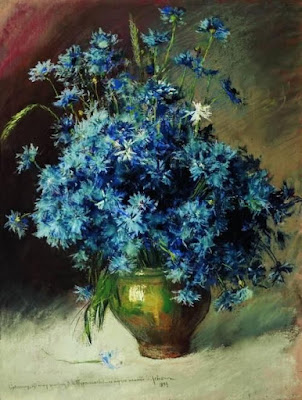Sometimes landscape artists take a break from sitting outdoors and instead, stay inside painting flowers. That's what Levitan has done here: though this "painting" isn't a painting at all, but pastels on cardboard. Here the artist has placed a bunch of wild and varying-ly blue cornflowers (with a couple of white ones) and two pieces of grass with seed heads in a contrasting, brown-glazed, earthenware pot. It's quite clear, Levitan loved flowers.
Perhaps he painted landscapes and still-life flowers in an attempt to heal himself psychologically. He'd lost both of his parents when he was a teenager, was homeless for a time, had to drop out of art school because he couldn't pay the tuition, was sick with a bad heart, was what we would today call, clinically depressed, even to attempting suicide a number of times.
Levitan was also Jewish, suffering under the tsar's 650 laws (1881-94) regulating every aspect of Jewish life in Russia's cities. After a failed attempt to assassinate Tsar Alexander III, 20,000 Jews were expelled from Moscow to the countryside. Levitan and his siblings were caught up in that banishment.
In one book of flower symbology there is a little footnote indicating that cornflowers are symbols of tenderness. Tenderness means: kindness, affection, compassionate, caring, concerned, sympathetic, humanity, warmth, fatherliness, motherliness, gentleness, benevolence, generosity. Isn't it interesting that Levitan, who was orphaned as a boy, has chosen to picture cornflowers which symbolize tenderness, which means fatherliness and motherliness.
In one book of flower symbology there is a little footnote indicating that cornflowers are symbols of tenderness. Tenderness means: kindness, affection, compassionate, caring, concerned, sympathetic, humanity, warmth, fatherliness, motherliness, gentleness, benevolence, generosity. Isn't it interesting that Levitan, who was orphaned as a boy, has chosen to picture cornflowers which symbolize tenderness, which means fatherliness and motherliness.
But tenderness is always under attack. Saint Paul understands in writing to the Ephesians:
"There is to be no trace of bitterness among you, of passion, resentment, quarreling, insulting talk, or spite of any kind; be kind and tender to one another, each of you generous to all, as God in Christ has been generous to you." 4:32
A Harvard scholar spoke recently on TV in light of the recent desecration of Jewish cemeteries, bomb threats being phoned in to Jewish schools and daycare centers in thirty-three states. He said, "This is what happens when a divided country lives in the extremes of left and right; the middle ground is abandoned."
The national heart is becoming savage. Savage means uncivilized, violent, uncontrolled, ferocious. An organization called Savage Arms advertises: "Make the 2nd amendment your first priority." The ad continues, "To hold one of our firearms in your hands is to know what winning feels like." Your first priority?! Jesus said: "But seek first the Kingdom of God and his righteousness, and all these things will be given to you as well." Matthew 6:33. And Jesus also said: "If anyone wants to be first he must be the last of all and the servant of all." Mark 9:35
Whether he intended to or not, Levitan has given us these luminous cornflowers which are a symbol of tenderness. Instead of worrying about candy this Lent, we might consciously pursue tenderness. A friend is practicing what he's calling a Ministry of Smiling for Lent's forty days.
